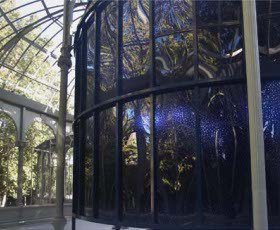Soledad Sevilla
dal 9/11/2011 al 28/2/2012
Segnalato da
9/11/2011
Soledad Sevilla
Museo Nacional Centro de Arte Reina Sofia, Madrid
Written in the celestial bodies. Sevilla has explored the relationship between light, matter and space, combining analytical rigor and geometric order with a search for a sensorial and organic experience. Her works possess an internal poetic logic that makes them singular. Playing an important role in them are the evocation of the intangible, reflection on time and language, the presence of the paradoxical and investigation into the perceptive conditions of the senses.

Since she began her career at the end of the 1960s, when she participated in the Seminar on Automatic Generation of Plastic Forms held at the Computing Centre of the Universidad Complutense de Madrid, Soledad Sevilla (Valencia, 1944) has explored the relationship between light, matter and space, combining analytical rigor and geometric order with a search for a sensorial and organic experience. Her works possess an internal poetic logic that makes them singular. Playing an important role in them are the evocation of the intangible, reflection on time and language, the presence of the paradoxical and investigation into the perceptive conditions of the senses.
Over time Soledad Sevilla moved from a style of painting that was serial and geometric (although always impregnated by small gestures and imprecisions that personalized and humanized it), to a more lyrical abstraction that seeks complicity between the emotional and the rational and where geometry becomes a tool for spatial analysis. In the mid 1980s she began to create her first installations. She considers installation art a medium complementary to the pictorial medium and establishes a rich feedback process between the two. In her installation pieces – which are situated on the border between sculpture, land art and architecture – Sevilla plays with the spectator's sensorial and bodily perception, with the tension between interiority and exteriority, between visibility and invisibility, between intimate experiences and public experiences, while always taking into consideration the specific features of the place hosting the installation. The artist designs abstract and complex structures but their organic dimension is always made clear, because they either incorporate or evoke natural elements and materials, undergo processes of cyclic transformation or are susceptible to the influence of external agents.
Written on the celestial bodies is an installation created specifically for Palacio de Cristal, in Madrid's Parque del Buen Retiro. In it Soledad Sevilla reproduces the dome and the walls of the building, using an aluminium structure and a series of polycarbonate panels that recreate the image of a night sky in which various linguistic signs are floating, as if they were randomly placed stars. In other words, the Palacio de Cristal, originally a greenhouse for tropical plants, contains a replica of itself that functions as a second skin. This skin is a porous and ephemeral one that protects from the exterior (from the outside), and at the same time reflects and recreates that exterior, enabling the building to become a space for reflection about the fragility of language and the need for communication and sharing.
This exhibition coincides with the Festival Miradas de Mujeres (Mujeres en las Artes Visuales)
Image: Soledad Sevilla
installation Written in the celestial bodies,
MNCARS, Palacio de Cristal 2011
Gabinete de Prensa tel 91 7741005 / 1006 Milena Ruiz Magaldi prensa1@museoreinasofia.es - prensa2@museoreinasofia.es
Museo Nacional Centro de Arte Reina Sofía
Sabatini Building, third floor, Zone A
Santa Isabel, 52- Madrid
Hours: Mon-sat 10-21, sun 10-14.30
Admission: 6 euro, 3 concessions



